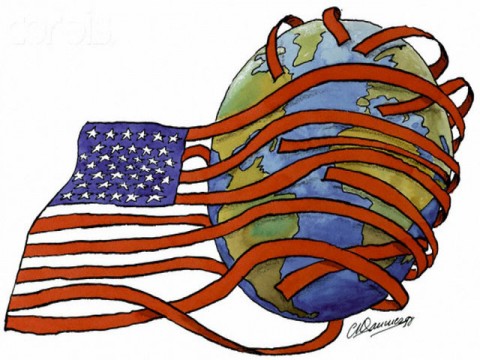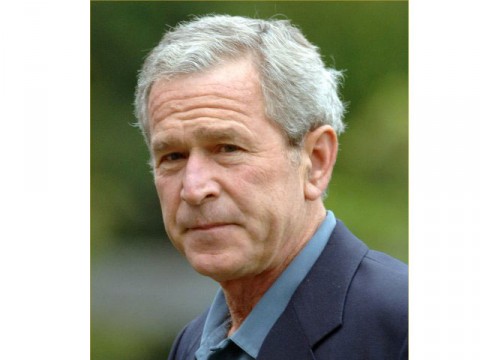- Web
- Humsa
- Videos
- Forum
- Q2A



Governance in the United States is at a standoff. The crisis over the federal budget has led many people around the world to wonder if Americans haven’t lost their minds.
Ultimately, as Winston Churchill infamously observed, they may be counted on to do the right thing after exhausting all other options. But this hardly is sound policy with every new vote in Congress. Maybe the latest crisis is symptomatic of a deeper and even more serious problem.
The future of the United States - and the American experiment - seems bleak. The optimism for which Americans are known comes less readily. While pessimism is nothing unique in American history - widespread since the time of the Puritans - its prevalence today is spread by the realisation that the country’s position of global superpower may soon be lost.
This realisation, regarded as a “post-hegemonic” fact, is no longer controversial. All empires vanish eventually. Hegemony indeed may be a form of imperial rule - it’s been called an empire with good manners - but that’s beside the point. American hegemony may be giving way to some other post-hegemonic condition. It is hard to say where it will lead, or what it signifies.
Some may say this would make the US a more “normal” nation. Normality resides in the eye of the beholder. Each nation is as normal or as abnormal as its people and observers imagine it to be. Many Americans still regard superpower status as being normal, however unpopular the burdens of global leadership are at times. The power of the US dollar, visa-free travel throughout much of the world and the global prevalence of English are still widely taken for granted, despite the country’s difficulties.
Yet this moment may represent a major psychological, even metaphysical, shift in the way that Americans relate to the rest of the world. To understand the change we must begin with perceptions.
The sheer size of America’s military and economy, its commercial and technological success, and the global penetration of its culture have underwritten a high standard of living and influence over others. Earlier, its reputation as a dynamic, free, prosperous nation - in the words of William Penn, a “good poor man’s country” - allowed some people to champion a special destiny for the proverbial people of plenty. This was later matched by the growth of the nation’s physical power.
Anyone who seeks to understand this history must start with the centrality of dichotomies in American life. It is still common to speak of “America and the world” as though the two exist separately in space and time. This can be traced back to the first such dichotomy: the New World and the Old. Related to it was one between civilisation and barbarism.
Meanwhile the loss of the nation’s hegemony has come to be seen by both Americans and non-Americans as leading away from gentility and progress. It is not merely a result of a smaller pie. Rather it’s due to the combination of socioeconomic and demographic disparities with rapid political and economic change at home and abroad. The Organisation for Economic Co-operation and Development has predicted that China and India alone will account for some 50 per cent of world GDP in 2060, as opposed to about 25 per cent today, and both countries’ economies are expected to be larger than America’s. Yet, the anticipated GDP per person in each country would still be a fraction of America’s: China’s about one-half, India’s about one-third.
Critics in the circumstances may welcome the idea of the United States descending to a state of pre-modern - or post-modern, post-industrial - dystopia dominated by reactionaries. A glance at the front pages of many US newspapers suggests they have a point. By most measures, America is less violent and poverty stricken than at many other moments in its history. But that’s not the perception.
One reason may be that there is less to offset it. The high-mindedness that the media once adopted as a matter of course has faded as broadcast and newspaper audiences have shrunk. More resemble tabloids in form and content. They also resemble, at least in their partisanship, the press of the 18th and 19th centuries. James was wrong: high-mindedness and hegemony go hand in hand, even in America. But can one survive without the other? And what shall follow?
Political scientists G. John Ikenberry, Robert Keohane, Charles Kupchan, Fareed Zakaria and others have addressed the latter question at length in a contemporary context, for the most part structurally from the outside in. A few others, notably the British journalists Anatol Lieven and Edward Luce, have done so culturally from the inside out.
The civilising process is not always neatly cyclical. Many of the stereotypical adjectives associated with the American character - restless, competitive, acquisitive, mobile, free-spirited, informal, inventive, expansive - would appear to mar the evolution of a modest, quiet country at peace with itself in the world, content to cultivate its own garden. Somewhere there ?must be another frontier.
In an ideal post-hegemonic world, a vibrant American economy and society would continue to combine cultural inclusion, diffusion and diversification with the kind of prosperity and competition that many Americans embrace. Doing so humbly, as George W. Bush suggested, is not ideal, however: Self-professed humility results too easily in charges of hypocrisy.
The US is still a big country; it can afford a few mistakes; it needn’t magnify them by conflation with the national ego. A better policy would be to allow America’s creative talent, sense of fair play and pragmatism to continue to flourish, minus the dichotomies. It is mainly up to Americans to decide if this can work on a smaller global scale and to start planning ahead before their country turns upon itself, irreparably.
 Ten years ago, when the Iraq War began, I was a producer in CNN’s Kuwait Bureau. For months leading up to that day, I had struggled to understand both - why George W Bush and his administration seemed so determined to fight the war and why they were so convinced it would go smoothly.
The answers to those questions have filled many books over the las..... Read more
Ten years ago, when the Iraq War began, I was a producer in CNN’s Kuwait Bureau. For months leading up to that day, I had struggled to understand both - why George W Bush and his administration seemed so determined to fight the war and why they were so convinced it would go smoothly.
The answers to those questions have filled many books over the las..... Read more
 CAIRO: Gunmen killed five Egyptian soldiers in an attack on an army patrol near the Suez Canal city of Ismailiya on Monday, security officials said.
The attack took place north of the city, where suspected militants have
repeatedly targeted security forces in recent weeks, the officials said.
Read more
CAIRO: Gunmen killed five Egyptian soldiers in an attack on an army patrol near the Suez Canal city of Ismailiya on Monday, security officials said.
The attack took place north of the city, where suspected militants have
repeatedly targeted security forces in recent weeks, the officials said.
Read more
 A young diplomat killed in Afghanistan will be remembered at memorial service on Tuesday at the suburban Chicago high school she attended, and where just a few months ago she spoke with students about her experiences in the US Foreign Service.
Anne Smedinghoff, 25, was killed along with four other Americans in a car bomb blast Saturday as their convoy ..... Read more
A young diplomat killed in Afghanistan will be remembered at memorial service on Tuesday at the suburban Chicago high school she attended, and where just a few months ago she spoke with students about her experiences in the US Foreign Service.
Anne Smedinghoff, 25, was killed along with four other Americans in a car bomb blast Saturday as their convoy ..... Read more












 Clean Chit (Faisal Raza Abidi ...
Clean Chit (Faisal Raza Abidi ...  Akhir Kiyon - 16th December 2...
Akhir Kiyon - 16th December 2...  To The Point - 16th December ...
To The Point - 16th December ...  Capital Talk â
Capital Talk â  Kal Tak - 16th December 2013
Kal Tak - 16th December 2013  Bay Laag - 16th December 2013
Bay Laag - 16th December 2013  Kharra Sach - 16th December 2...
Kharra Sach - 16th December 2...  Awaam - 15th December 2013
Awaam - 15th December 2013 





 Gold Miner
Gold Miner  Superbike GP
Superbike GP  Whipsaw Fighter
Whipsaw Fighter  PacMan
PacMan 


